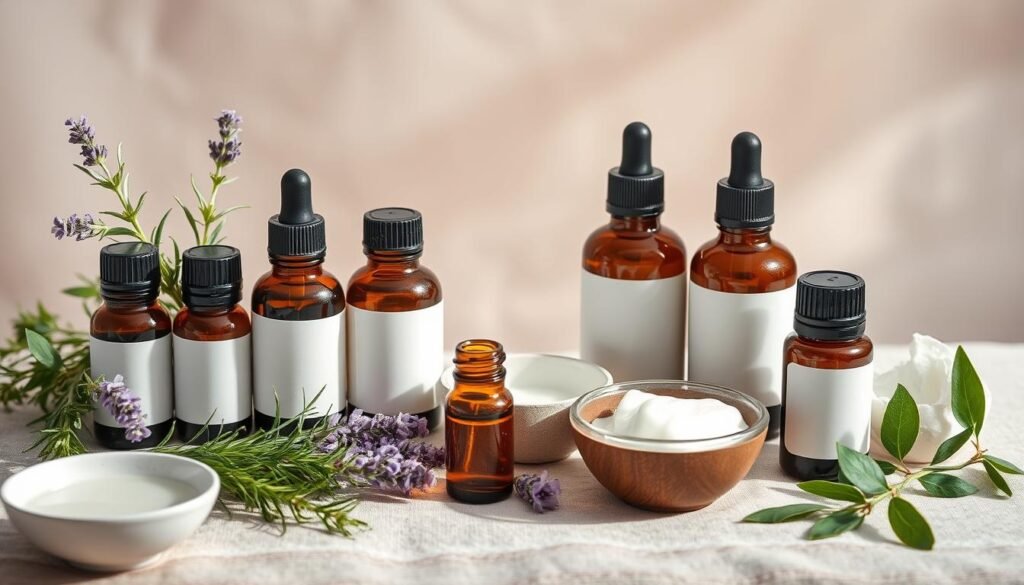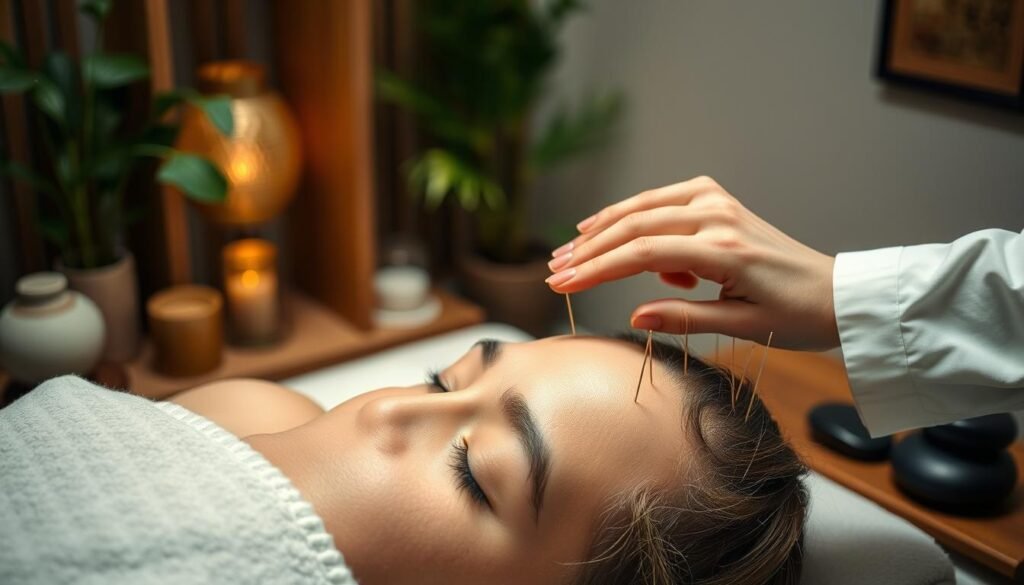About 6.8 million people in the United States suffer from some form of alopecia. This huge number shows how widespread hair loss is. It drives many to look for natural and alternative remedies. People want to find holistic treatments for baldness. They hope these options will help without the side effects that medicines might cause.
This article will give you a detailed look at various remedies and how well they work for alopecia. By exploring the different treatments available, you can make smart choices about how to get healthy hair back.
Key Takeaways
- Alopecia affects millions, highlighting the importance of effective treatments.
- Natural and alternative remedies are increasingly popular among those seeking non-invasive solutions.
- Understanding various treatment options can empower individuals in their hair-loss journey.
- Holistic approaches often complement traditional methods for improved results.
- Awareness of treatment effectiveness varies for different individuals and hair loss types.
Understanding Alopecia: The Basics
Alopecia includes many conditions that cause hair loss. Knowing the different types of alopecia is crucial. The common types of alopecia are:
- Androgenetic alopecia – Also known as male or female pattern baldness, it’s a genetic issue that affects many.
- Alopecia areata – This autoimmune disorder causes sudden hair loss in patches.
- Telogen effluvium – Stress or hormonal changes can lead to this temporary hair loss.
It’s also important to understand the causes of hair loss. Key factors include:
- Genetic predisposition – Having a family history of hair loss can increase your risk.
- Autoimmune issues – Conditions like alopecia areata occur when the immune system attacks hair follicles.
- Environmental influences – Bad nutrition, stress, and toxins can all lead to hair loss.
There are various symptoms of alopecia. Common alopecia symptoms are:
- Thinning hair – You might notice your hair getting thinner while brushing it.
- Patchiness – Sometimes, sudden bald spots can appear on your scalp or body.
- Complete baldness – In severe cases, it’s possible to lose all hair on the scalp and body.
Natural and Alternative Remedies for Alopecia
Many people are looking for effective hair loss solutions. They are turning to natural and alternative remedies for alopecia. These methods are popular because they are gentle. People like that they do not have to use strong medicines.
Looking at health as a whole is key in holistic treatments for hair loss. People use plant therapies, change their diets, and focus on self-care. More people are trying these options and having good experiences.
But remember, it’s important to talk to doctors when trying new treatments. There are many alternative options available. This lets people choose the best method for their hair loss problem.
The Role of Herbal Treatments
Herbal treatments for hair loss are getting popular for their natural side. They come from traditions that focus on boosting hair growth and keeping the scalp healthy. This part talks about well-known herbal remedies, what they do, and if they really work.
Common Herbal Solutions
There are several herbs known to help fight hair loss. Key ones include:
- Ginseng: It’s praised for making hair grow by improving blood flow in the scalp.
- Rosemary: Known for making hair thicker and better, it might also help prevent gray hair.
- Saw Palmetto: It’s linked to hormone balance and is often brought up when talking about androgenic alopecia.
Effectiveness of Herbal Remedies
Studies give us clues about how good herbal remedies are against alopecia. One study showed a herbal mix increasing hair thickness and density. Such herbal solutions, like Zimmer aqueous spray (ZAS), can be a natural pick over common drugs like minoxidil or finasteride. More on natural alopecia treatments can be found here.
The success of these herbal remedies is backed by both stories and science. Many research efforts find herbs in hair treatments link to better hair growth results.
| Herb | Potential Benefits | Traditional Uses |
|---|---|---|
| Ginseng | Stimulates hair growth | Enhancing vitality and circulation |
| Rosemary | Improves hair thickness | Used in hair rinses |
| Saw Palmetto | Balances hormones | Treating urinary issues and hair loss |
Essential Oils and Their Benefits
Essential oils are a natural way to boost hair growth and make your scalp healthier. People like using essential oils because they can feed hair roots and help with blood flow. Adding these oils to your hair care can make your hair better over time.
Popular Essential Oils for Hair Growth
- Lavender Oil: Famous for being soothing, lavender oil might help your hair grow by acting on the hair follicles.
- Peppermint Oil: This oil can boost blood flow in the scalp, possibly making your hair thicker.
- Tea Tree Oil: Known for fighting germs, tea tree oil keeps the scalp clean and promotes hair growth.
Application Techniques
Knowing how to apply essential oils is key to getting their full benefits. Using them correctly ensures they’re safe and work well:
- Dilution: Mix essential oils with a carrier oil like coconut or jojoba oil to avoid irritation. Use 3-5 drops of essential oil for every tablespoon of carrier oil.
- Massage: Rub the oil blend gently into your scalp to help soak it in and wake up hair roots.
- Frequency: For good results, put the oil blend on your scalp 2-3 times a week. Let it sit for at least 30 minutes before washing it off.

By making these practices part of your normal hair care, you can make the most of essential oils. This makes your hair and scalp healthier and helps your hair grow. Getting to know the special qualities of each oil lets you pick the best ones for your hair needs.
Scalp Massages: An Easy Solution
Scalp massages are a simple way to boost hair growth. The scalp massage benefits go beyond just feeling relaxed. They also play a big part in increasing blood flow to your hair roots. This extra blood flow feeds the scalp and helps with hair regrowth techniques.
Doing scalp massages every day can reduce stress, leading to healthier hair. Stress can harm your hair, so it’s important to relax. You can easily do these massages at home in just a few minutes.
- Use fingertips to apply gentle pressure in circular motions.
- Incorporate natural oils like coconut or jojoba for added nourishment.
- Consider a timed routine, such as 5-10 minutes daily.
- Experiment with different techniques to find what feels most comfortable.
These non-invasive hair loss remedies fit easily into your routine. With regular use, you may see better scalp health and more hair growth. Trying this with other relaxation methods can give great results over time.
Dietary Supplements for Hair Health
Good nutrition is key for healthy hair, especially if you’re losing hair. Vitamins and minerals keep hair follicles strong and grow hair. Taking the right dietary supplements can boost hair health and lessen hair loss.
Key Nutrients and Their Functions
Certain nutrients are essential for hair growth and health. Knowing what they do helps in picking supplements for hair loss.
- Biotin: This vitamin B7 boosts keratin, making hair strong.
- Zinc: It helps make proteins and divides cells, crucial for hair growth.
- Vitamin D: It’s important for making new hair follicles and helps them regrow.
- Iron: Needed for good blood circulation, iron brings nutrients to hair roots.
- Omega-3 Fatty Acids: They keep hair nourished and scalp healthy, reducing hair loss risks.
Recommended Dietary Supplements
To fight hair loss, consider these natural and store-bought supplements. Here’s a list of products designed to improve hair health:
| Supplement | Key Ingredients | Benefits |
|---|---|---|
| Nutrafol | Biotin, Saw Palmetto, Zinc | Supports hair strength and growth |
| Viviscal | Marine Protein, Biotin, Vitamin C | Promotes existing hair growth |
| Hairfinity | Biotin, Vitamin D, A | Enhances overall hair health |
| Nature’s Bounty Hair, Skin & Nails | Biotin, Vitamin C, E | Improves texture and strength |
| Garden of Life MyKind Organics | Organic botanicals, biotin | Supports healthy hair growth |
Stress Management Techniques
Stress and hair loss are closely connected. High stress can hurt our health, leading to issues like alopecia. Learning to manage stress helps in promoting hair growth and fighting alopecia.
Adding stress relief methods to your daily life improves mental health. Popular methods include:
- Mindfulness Meditation: Helps focus on the present, calming the mind and lowering anxiety.
- Yoga: Merges motion and breath control for relaxation and reduced stress.
- Regular Exercise: Physical activities release endorphins, elevating mood and lessening stress.
- Deep Breathing Exercises: Simple techniques to decrease stress and bring relaxation.
- Social Connections: Being with loved ones offers emotional support, crucial for lowering stress.
Different methods have unique advantages. They work together for a balanced stress management strategy. By valuing mental health, you can lessen stress’s impact on alopecia, aiding in healthier hair growth.
| Stress Relief Method | Benefits | Time Commitment |
|---|---|---|
| Mindfulness Meditation | Enhances focus and promotes relaxation | 10-30 minutes daily |
| Yoga | Improves flexibility and reduces tension | 30-60 minutes several times a week |
| Regular Exercise | Boosts mood and releases endorphins | 30 minutes most days |
| Deep Breathing Exercises | Reduces anxiety and stress | 5-15 minutes as needed |
| Social Connections | Provides emotional support and reduces loneliness | Varies, ideally frequent |
Acupuncture: An Alternative Approach
Acupuncture is becoming a favorite alternative for treating alopecia. This old method comes from traditional Chinese medicine. It boosts overall health by targeting specific body points. For hair loss, it increases scalp blood flow, helping hair follicles.
Acupuncture does more than improve physical health. It lowers stress and anxiety, making a better environment for hair to grow back. You might go for sessions weekly or every other week, based on your needs.
Studies show acupuncture can make hair thicker and healthier. It might even help grow new hair. People like its whole-body approach. It looks at both symptoms and what’s causing hair issues.

| Benefits of Acupuncture | Traditional Perspective | Recommended Frequency |
|---|---|---|
| Improved blood circulation | Enhances Qi flow | 1-2 times per week |
| Stress reduction | Balances emotional health | As needed |
| Stimulated hair follicles | Fortifies hair vitality | Every 2 weeks |
If you’re considering acupuncture for alopecia, it could be a smart and rewarding choice. This method mixes physical touch and mental calm. It offers a complete way to tackle hair loss.
Hypnotherapy and Its Impact on Alopecia
Hypnotherapy for hair loss is an interesting practice that works on the mental aspects of alopecia. It emphasizes the importance of the mind-body link. Stress and anxiety can make hair loss worse. Through relaxation methods, people can lower stress, possibly leading to healthier hair.
By addressing the mental side of hair loss, hypnotherapy helps change how people think and feel. Many say they feel more confident and positive after their sessions. Such changes are key for a mindset that helps hair grow back.
Therapists work to uncover emotional triggers linked to hair loss. Resolving these issues may not only help with hair but also boost overall happiness. Having regular sessions creates a routine that encourages relaxation and personal growth.
| Hypnotherapy Benefits | Potential Effects on Alopecia |
|---|---|
| Promotes relaxation | Reduces stress linked to hair loss |
| Improves self-esteem | Enhances self-perception regarding hair |
| Encourages positive thinking | Helps in developing a growth mindset |
| Reduces anxiety | Less tension can limit damage to hair follicles |
Hypnotherapy stands out among alternative treatments for hair loss. It offers a path to healing physically and emotionally. This method is a hopeful choice for those wanting to better their experience with alopecia.
Homeopathic Remedies: Do They Work?
Studying homeopathy for hair loss presents an interesting world of alternative healing. This method believes in “like cures like.” It uses very diluted substances to encourage the body to heal itself. Fans think it targets the root causes of hair loss.
Common homeopathic remedies include:
- Silicea: Often recommended for improving hair strength.
- Lycopodium: Suggested for individuals experiencing premature graying.
- Phosphorus: Used for stimulating hair follicles.
These natural, side-effect free remedies are popular among those looking for milder treatments. Picking the right remedy is hard, though. Usually, people see experts for personalized advice based on their health and symptoms.
There are studies that show good results using homeopathy for hair loss. But, there’s also skepticism about how well it works. This debate emphasizes why personalized plans and research are crucial before starting any treatment.
Many are happy with homeopathic methods, but keeping expectations realistic is key. Homeopathy can go hand in hand with regular treatments, supporting overall health and not just acting as a quick fix.

Natural Hair Care Practices
Natural hair care is key to having lovely, strong hair. Choosing natural hair care tips over harsh chemicals helps improve hair health. Gentle care and picking the right products are crucial for hair vitality.
Natural ingredients offer benefits that typical products do not. Coconut oil, argan oil, and aloe vera nourish without harmful chemicals. These ingredients keep the hair’s natural moisture while improving its health.
Improving hair care routines involves a few steps. Avoid too much heat styling, keep your hair moisturized, and eat well. Looking into natural growth remedies is also a smart move.
Adding these tips to your daily routine does more than make your hair look good. It leads to fundamentally stronger, healthier hair. Using top-quality ingredients and gentle care helps your hair grow better and stay healthy.
Conclusion
Looking into natural and alternative treatments for hair loss seems promising. Remedies like amino acids and caffeine can boost hair health. It allows individuals to choose what best fits their needs.
The search for natural remedies continues to advance. Compounds in curcumin, garlic, and marine extracts show promise against hair loss. Keeping up with research helps people find the best support for their hair.
A holistic approach combines these natural remedies with other treatments. It also looks at how lifestyle affects hair loss. This effort can improve overall health and bring hope. Here is a resource for more information on these natural solutions. Although dealing with alopecia is tough, available options can help regain confidence and well-being.